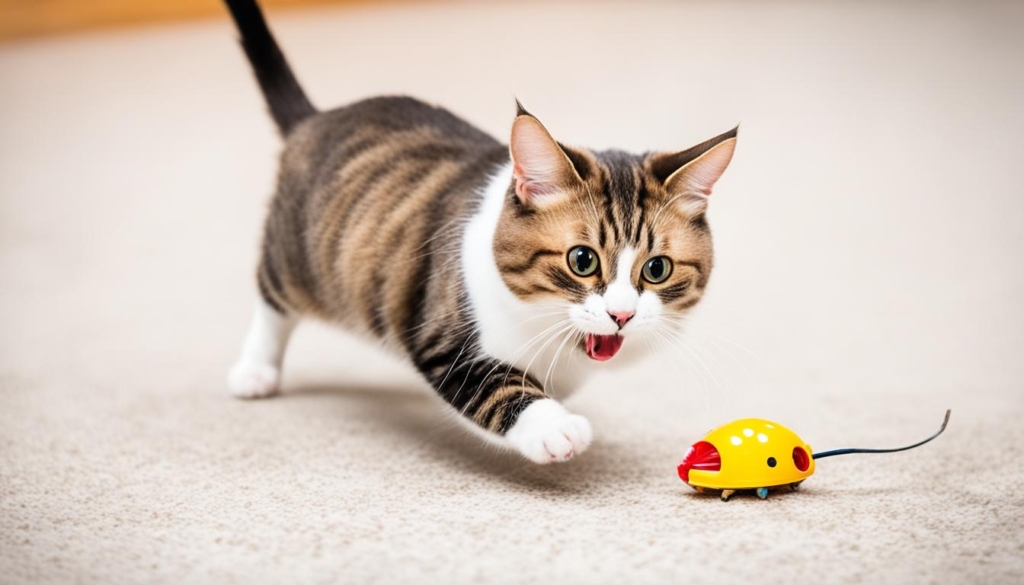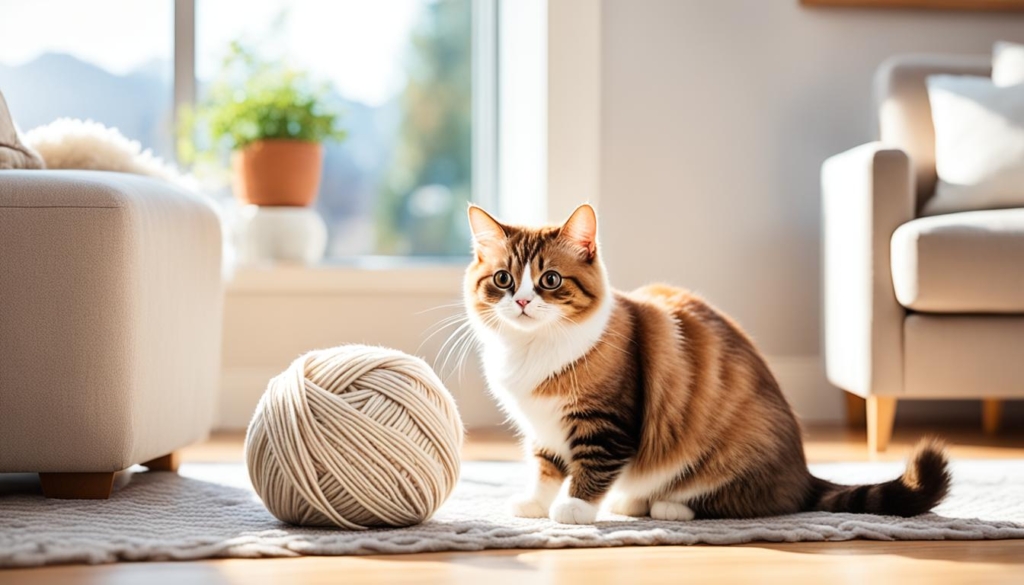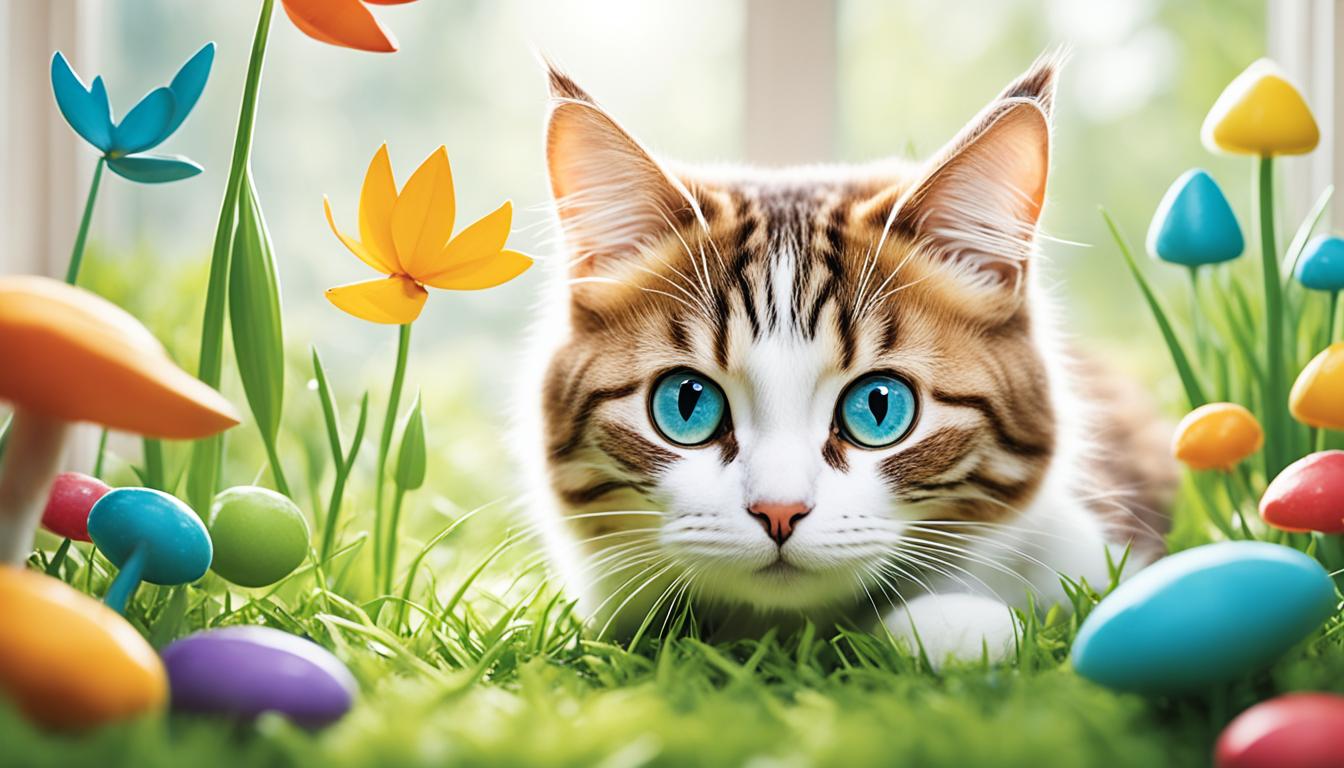Munchkin cats are known for their short, stubby legs. They are a unique breed of domestic cat. People often debate how smart they are. This article will look into their intelligence, how they compare to other cats, and how to care for them.
We’ll talk about their problem-solving skills, adaptability, and trainability. This will show what makes Munchkin cats special in the cat world.
Key Takeaways
- Munchkin cats show high intelligence with their curiosity and energy.
- Being curious and full of energy makes them smart. It pushes them to explore and play.
- Even with short legs, Munchkin cats can do well with the right care and mental challenges.
- They’re not the smartest breed but are known for being friendly, curious, and playful.
- Interactive toys and games can keep Munchkin cats busy and prevent boredom.
Munchkin Cat Overview
Munchkin cats became a recognized breed in 2003 by The International Cat Association (TICA). They stand out with their short, stubby legs, about 3 inches shorter than usual. Despite their small legs, Munchkin cats have normal-sized bodies. They look like regular cats but are shorter.
Physical Characteristics
Munchkin cats have different coat lengths, colors, and patterns. They can be short-haired, medium-haired, or long-haired. These cats usually weigh between 6 to 9 pounds and can be up to 18 inches long from nose to tail. Their name, “Munchkin,” comes from the small characters in L. Frank Baum’s “The Wonderful Wizard of Oz.”
Personality Traits
Munchkin cats are friendly, playful, and love attention. They enjoy being around people and are great with families. These cats are active and love to play, chase toys, and explore. They are also smart and can learn simple tricks.
“Munchkin cats are described as active, affectionate, sociable, intelligent, and playful animals.”
| Characteristic | Description |
|---|---|
| Physical Traits |
|
| Personality |
|
History and Origins of the Munchkin Cat Breed
The Munchkin cat breed started in the 1940s in the United Kingdom. Short-legged cats were seen now and then. But, the breed we know today comes from a cat named Blackberry found in Louisiana, USA, in the 1980s.
The Discovery of Blackberry
A music teacher named Sandra Hochenedel found Blackberry, a pregnant cat with short legs. Her kittens included both short-legged and normal-legged ones. This showed the genetic mutation that would lead to the Munchkin breed.
Breeding Process and Genetics
Munchkin cats have short legs due to a genetic mutation. This mutation is passed down in an autosomal dominant way. It means the gene is not linked to sex and shows up with one or two copies.
But, if a Munchkin cat passes this gene to two offspring, they won’t survive. So, Munchkins can only be bred with regular cats. This way, it’s ethical and the kittens have a 50% chance of getting the short legs.
| Munchkin Cat Facts | Details |
|---|---|
| Munchkin Cat Origins | The Munchkin breed was first discovered in the 1940s in the United Kingdom and was officially recognized by The International Cat Association in 2003. |
| Munchkin Cat Size | Munchkin cats can weigh up to 9 pounds and reach up to 18 inches in length. |
| Munchkin Cat Lifespan | Munchkin cats have a lifespan of up to 15 years on average. |
| Munchkin Cat Genetics | The gene responsible for short legs in Munchkin cats is autosomal dominant, and breeding two Munchkins together can result in lethal gene combinations. |
The Munchkin breed has a fascinating history and origin. It began with sightings in the United Kingdom and was shaped by the discovery of Blackberry in Louisiana. Today, the Munchkin’s genetic legacy is loved by cat fans all over the world.
Controversy Surrounding the Munchkin Cat
The Munchkin cat breed has sparked debate in the cat world. Some think it’s wrong to breed cats with short legs due to health risks or reduced mobility. They believe the Munchkin’s look is an unnatural deformity that shouldn’t be kept going.
But, others support the Munchkin cat breed. They say Munchkins don’t have more health problems than other cats. They believe these cats can live happy lives despite their size.
The Munchkin cat is the feline equivalent of the Dachshund due to their short legs and long spine, which can potentially lead to health issues and mobility restrictions.
The debate focuses on the ethics of breeding a cat with a genetic mutation. Supporters believe Munchkins can be healthy and happy. Critics worry about long-term health issues linked to their size and spine.
This issue has split the cat community, with some groups not accepting the breed. The Munchkin cat breed controversy keeps sparking discussions and debates.

Signs of Intelligence in Munchkin Cats
Munchkin cats are known for their exceptional intelligence and problem-solving skills. These agile felines show a high level of Munchkin cat intelligence and Munchkin cat cognitive abilities. They are playful and curious, which shows their smart nature.
Playfulness and Problem-Solving Skills
Munchkin cats learn quickly and love interactive play. They come up with creative ways to have fun. They are curious and enjoy exploring, showing off their Munchkin cat problem-solving skills.
Owners often say their cats remember where they hid their favorite toys. This shows their great memory and problem-solving skills.
Trainability and Adaptability
Munchkin cats are also very Munchkin cat trainable and adaptable. They do well with positive reinforcement training, like clicker training. They can learn many commands and behaviors.
They are also Munchkin cat adaptable, fitting into different homes and environments. This makes them great pets for families, singles, and seniors. Their friendly nature and desire to please people help them learn new things. With patient and consistent Munchkin cat training methods, Munchkins can show off many impressive behaviors.
“Munchkin cats are not only adorable but also incredibly smart. Their playful nature and problem-solving skills are a constant source of entertainment for their owners.”
How intelligent are Munchkin cats?
Munchkin cats are known for being quite smart. They are often seen as one of the more intelligent cat breeds. They are great at solving problems, learning quickly, and adjusting to new things. Their playful nature, ability to learn, and how they move around show they are very smart.
Comparing Feline Intelligence Levels
It’s hard to measure cat intelligence because it shows in different ways. Things like being social, remembering things, solving problems, and learning new things help show how smart a cat is. In these areas, Munchkin cats do very well compared to other cats:
- They are curious, friendly, and love to explore, which helps them learn and adapt easily.
- They are very good at solving problems, showing creativity and determination in finding answers.
- They are easy to train because they respond well to rewards and learn many commands and tricks.
Every Munchkin cat is different, so their smarts can vary. But, the breed is known for being very smart compared to other cats.
“Munchkin cats are known for their playful, intelligent, and adaptable nature, making them a favorite among cat enthusiasts.”
Providing Mental Stimulation for Munchkin Cats
Munchkin cats are smart, curious, and love to explore. They need lots of chances to play and learn to stay happy and sharp. Toys and games that challenge them are perfect for keeping their minds busy.
Interactive Toys and Games
Puzzle feeders, toys that give treats, and wands are great for Munchkin cats. These toys make them work for their food, keeping their brains active. Teaching them tricks with clicker training also helps improve their problem-solving skills.
Munchkin cats are as smart as other cats and can learn a lot. Giving them different toys and activities helps them grow and stay healthy.
“Munchkin cats are quick learners and can be easily trained using positive reinforcement techniques.”
It’s important to keep Munchkin cats busy and happy. Toys, puzzles, and training can make them smarter and more content.
Grooming and Exercise Needs of Munchkin Cats
Munchkin cats, despite their short legs, need regular grooming and exercise. They have coats that require brushing and bathing to stay healthy. Long-haired Munchkins are especially prone to matting and hairballs.
These cats are full of energy and love to run, jump, and play. They need lots of space to move around. Providing them with toys and cat trees can help keep them active and prevent boredom.
Even though they’re small, Munchkins are agile and enjoy climbing. It’s important to make sure they have safe places to climb. This keeps them happy and healthy.
| Grooming Requirements | Exercise Needs |
|---|---|
|
|
By taking care of your Munchkin cat’s grooming and exercise needs, you keep them happy and healthy. Paying attention to their activity levels is key for their well-being.
Health Considerations for Munchkin Cats
The long-term health effects of the Munchkin’s genetic mutation are still being studied. Munchkin cats don’t have any breed-specific health issues. But, their short legs might make them more prone to certain conditions like urinary tract problems, thyroid disorders, and joint issues. It’s important to keep them healthy with regular vet visits and a balanced diet.
As the breed evolves, it’s key for breeders to focus on the health of Munchkins. They should watch for any new health problems.
Potential Health Issues
Munchkin cats might face health issues like osteoarthritis because of the stress on their joints. They can also have lordosis, a spinal deformity. Obesity is another common issue for them, possibly because of their short stature.
Recommended Care
Looking after a Munchkin cat means meeting their special needs. This includes regular vet visits, a balanced diet, plenty of exercise, and a safe home. They might need special help to reach things like litter boxes and scratching posts because of their short legs.
It’s important to watch out for weight gain in Munchkin cats since they can easily become overweight. This can make joint or skeletal problems worse. With the right care, Munchkin cats can live happy lives of 12 to 15 years.
| Munchkin Cat Health Consideration | Explanation |
|---|---|
| Osteoarthritis | Munchkin cats may suffer from osteoarthritis due to the stress on their joints from their unique body structure. |
| Lordosis | Lordosis, a spinal deformity causing an excessive inward curvature of the lower back, is more commonly found in short-legged Munchkin cats. |
| Obesity | Obesity is a common health problem in Munchkin cats, potentially exacerbated by their short stature leading to a predisposition for gaining excess weight. |
| Pectus Excavatum | Pectus excavatum is a condition that can affect Munchkin cats and can lead to potential health complications. |
Choosing a reputable breeder who offers a health guarantee is key to avoiding genetic health problems. Munchkin cats are usually healthy, but as a new breed, their health could change. They need regular grooming, including brushing, nail trimming, ear cleaning, and teeth brushing from an early age.
Living with a Munchkin Cat
Munchkin cats are great pets for many families. They are friendly, loving, and playful. These small cats fit well with kids, singles, and seniors. They love attention and enjoy being close to their people, often following them around for cuddles and play.
Munchkin Cat Personality Traits
Munchkin cats are smart and adaptable. They fit into different homes, from small apartments to big houses. They are curious and love to play. Their small size lets them move easily and explore their world.
Looking for a loyal pet or a fun companion? Munchkin cats will win your heart with their loving and playful nature. They add a special touch to any home with their affection and fun.

“Munchkin cats are the perfect blend of intelligence, playfulness, and affection. They bring so much joy and laughter into our home.”
– Sarah, proud Munchkin cat owner
Conclusion
The Munchkin cat breed is special and has won the hearts of many cat lovers. They show great intelligence, problem-solving skills, and can adapt well. These cats are playful and loving, making great pets for many homes.
As the Munchkin breed grows, it’s important for breeders and cat lovers to focus on the cats’ well-being. Giving them the right care, mental challenges, and a safe place is key. This way, owners can enjoy these short-legged cats for many years.
In short, the Munchkin cat breed is unique and offers a special experience for those looking for a smart, adaptable, and loving pet. With the right care, these cats can flourish and become cherished members of their families.


